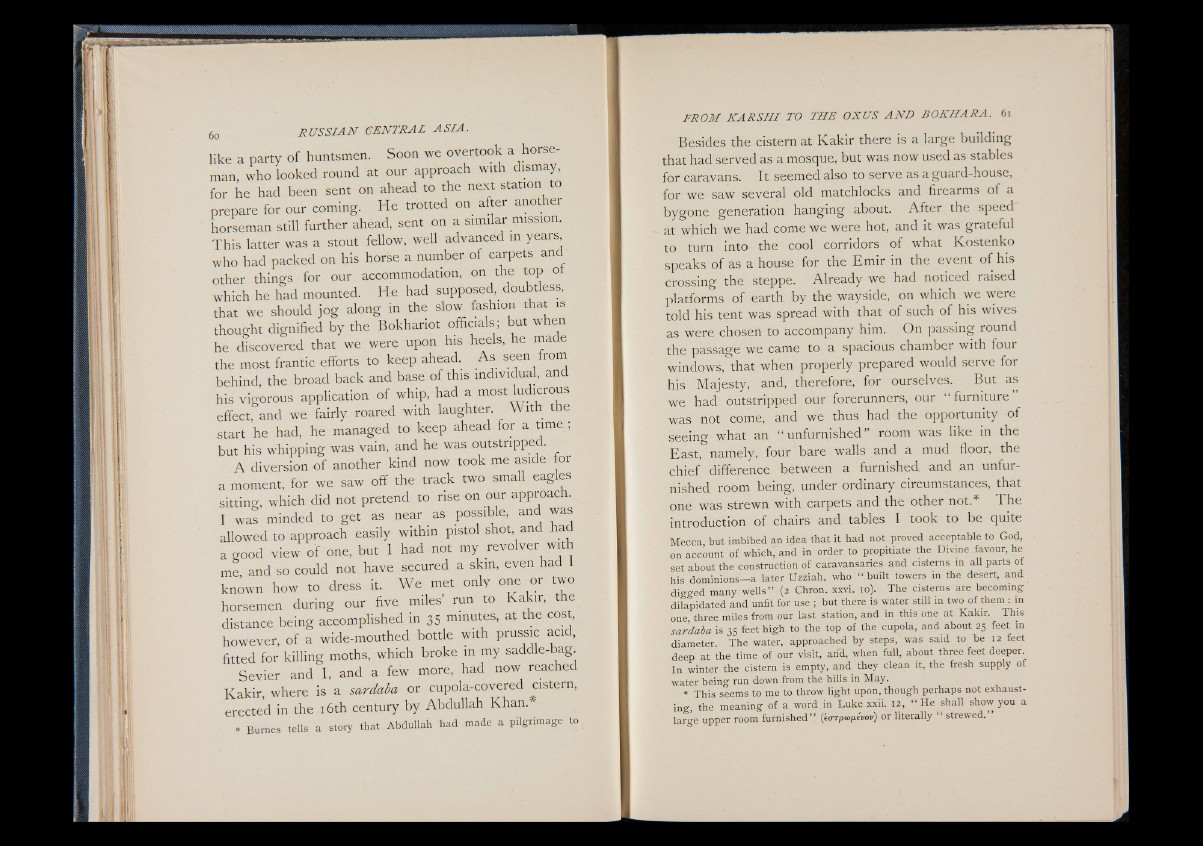
6o R U S S IA N GENERAL A S IA .
like a party of huntsmen. Soon we overtook a horseman
who looked round at our approach with dismay,
for he had been sent on ahead to the next station to
prepare for our coming. He trotted on after another
horseman still further ahead, sent on a similar mission.
This latter was a stout fellow, well advanced in years,
who had packed on his horse a number of carpets and
other things for our accommodation, on the top o
which he had mounted. He had supposed, doubtless,
that we should jo g along in the slow fashion that is
thought dignified by the Bokhariot officials; but when
he discovered that we were upon his heels, he ma e
the most frantic efforts to keep ahead. As seen from
behind, the broad back and base of this individual, and
his vigorous application of whip, had a most lu mrous
effect, and we fairly roared with laughter. With t e
start he had, he managed to keep ahead for a tim e ;
but his whipping was vain, and he was outstripped.
A diversion of another kind now took me aside or
a moment, for we saw off the track two small eagles
sitting, which did not pretend to rise on our approach.
I was minded to get as near as possible, and was
allowed to approach easily within pistol shot, and had
a good view of one, but I had not my revolver with
me and so could not have secured a skin, even had
known how to dress it. W e met only one or two
horsemen during our five miles’ run to Kakir, e
distance being accomplished in 35 minutes, at the cost,
however, of a wide-mouthed bottle with prussic acid,
fitted for killing moths, which broke in my saddle-bag,
Sevier and I, and a few more, had now reached
Kakir, where is a sardaba or cupola-covered cistern,
erected in the 16th century by Abdullah Khan*
* Bumes tells a story that Abdullah had made a pilgrimage to
Besides the cistern at Kakir there is a large building
that had served as a mosque, but was now used as stables
for caravans. It seemed also to serve as a guard-house,
for we saw several old matchlocks and firearms of a
bygone generation hanging about. After the speed
at which we had come we were hot, and it was grateful
to turn into the cool corridors of what Kostenko
speaks of as a house for the Emir in the event of his
crossing the steppe. Already we had noticed raised
platforms of earth by the wayside, on which we were
told his tent was spread with that of such of his wives
as were chosen to accompany him. On passing round
the passage we came to a spacious chamber with four
windows, that when properly prepared would serve for
his Majesty, and, therefore, for ourselves. But as
we had outstripped our forerunners, our “ furniture
was not come, and we thus had the opportunity of
seeing what an “ unfurnished” room was like in the
East, namely, four bare walls and a mud floor, the
chief difference between a furnished and an unfurnished
room being, under ordinary circumstances, that
one was strewn with carpets and the other not. T he
introduction of chairs and tables I took to be quite
Mecca, but imbibed an idea that it bad not proved acceptable to God,
on account of which, and in order to propitiate the Divine favour, he
set about the construction of caravansaries and cisterns in all parts of
his dominions—a later Uzziah, who 1 built towers in the desert, and
digged many wells” (2 Chron. xxvi. .10).' The cisterns are becoming
dilapidated and unfit for use ; but there is water still in two of them : in
one three miles from our last station, and in this one at Kakir. This
sardaba is 35 feet high to the top of the cupola, and about 25 feet in
diameter. The water, approached by steps, was said to he 12 feet
deep at the time of our visit, and, when full, about three feet deeper.
In winter the cistern is empty, and they clean it, the fresh supply of
water being run down from the hills in May.
* This seems to me to throw light upon, though perhaps not exhausting,
the meaning of a word in Luke xxii. 12, “ He shall show you a
large upper room furnished” (i<rrpa>ptvov) or literally “ strewed.”